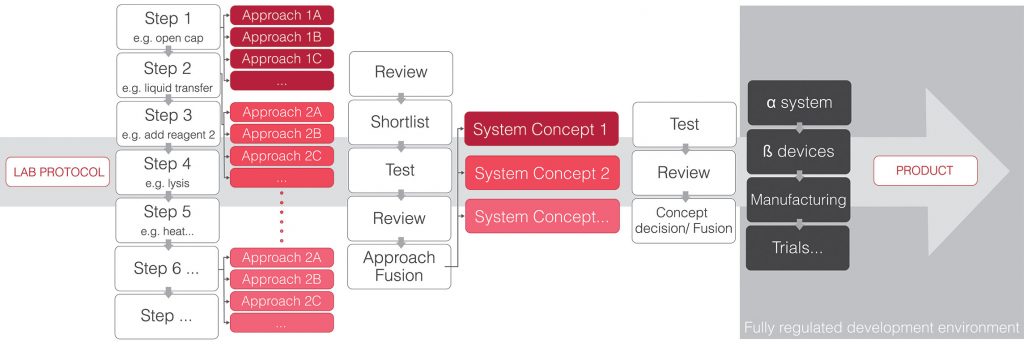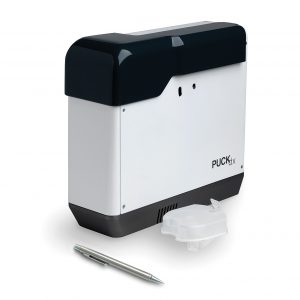Sponsored content brought to you by
From cell phones to lab automation and from printing to drug delivery, TTP has been inventing and developing world-leading technology and products for clients in diverse industries for over 30 years.
During the past decade, the Cambridge, U.K.-based company has combined its heritage strengths with expertise in life science and continued to build its track record with market-leading desktop instruments for both life science research and diagnostics markets.
The Decentralization of Instrumentation
Recent years have seen a market evolution in many areas of life science where instrumentation has moved from expert-user systems housed in centralized facilities to user-friendly and low-cost devices for research labs and clinics. Early examples include Guava’s low-cost cytometers and more recently, ONT’s Minion and the Illumina i-Seq sequencing systems. Similarly, in the diagnostic arena, point-of-care systems are finally gaining traction in near-patient and decentralized clinical settings.
The success of instruments in these markets depends on a fusion of multidisciplinary science insight, product engineering, increasingly communications technology, and the ability to transfer complex processes onto simple devices.

TTP Desktop Biology
TTP’s Desktop Biology provides a full “protocol to product” route for companies entering these markets, supporting clients in translating their technologies and/or biological assays into market-ready systems.
The typical Desktop Biology approach is outlined in Figure 1. Working closely with clients, when necessary by observing lab-based protocols, TTP’s scientists and engineers identify key steps and consider potential solutions for each of these before using know-how, modelling tools, and rapid testing to shortlist, de-risk, and fuse approaches to enable a selection of integrated concepts for further development. Often this also includes protocol refinement prior to, and during, development.
At TTP, more than 350 engineers, biologists, chemists, and physicists are working together in a uniquely inventive environment. TTP has built, and invested in, additional personnel and capabilities to support clients in bringing life science systems to market readiness. This includes engineering capabilities in developing instrumentation and bioanalytical tools and a team versed in assay development combined with expertise in protein and cell biology, genetic engineering, and genomics.
As systems become ever smaller, with concomitant component integration and simplification, the interplay between biological function and engineering choices becomes key to performance. Functional testing is central to TTP’s work and the team of biologists enables design choices and product development to be informed by rounded engineering–chemistry–biology insight.
In two recent Desktop Biology developments—one for life science research and one for diagnostics—TTP created the Cyto-Mine® single cell analyzer for Sphere Fluidics and the Atlas io™ for Atlas Genetics—a compact instrument for rapid infectious disease diagnosis. Both systems comprise an easy-to-use instrument and a low-cost, single-use cartridge for sample input and walkaway operation.
Where suitable, clients can benefit from TTP’s proprietary platforms and technologies, which address the needs of current and future biology and diagnostics. This includes TTP’s IP in process integration as well as specific steps such as lysis, molecular and cellular deposition, ultra-rapid thermal cycling, optical and electronic detection, and low volume highly controlled liquid movement. One example of TTP’s unique approach is Puckdx™—the robot in a coffee pod—described in the sidebar.
What Next for Desktop Biology?
The blurring of the distinction between life science and diagnostic platforms means that TTP now routinely develops systems that are more research tool in the traditional sense, yet with at least one eye on, and often fully compliant with, FDA and ISO 13485 requirements, so that being “diagnostic ready” does not limit a system’s market potential in the future.
TTP are also seeing the cusp of consumer biology—systems undertaking complex biology for consumer use, whether for well-being, veterinary, and other applications—often moving from desktop to palmtop, and combined with this an ever-increasing need to integrate communications capabilities and enabling information transfer to the user and beyond.
Giles Sanders of TTP Desktop Biology observes: “I would not be surprised if some of the most exciting applications of our approach arise in contexts where large-lab infrastructure is less well established. Akin to the cell phone taking off in low-resource settings and the land line phase of ownership being skipped, one can imagine point-of-clinic diagnostic platforms doing the same in contexts where centralized lab infrastructure does not have a major foothold.”
TTP Desktop Biology
Puckdx™ – The Robot in a Coffee Pod
TTP’s Puckdx system offers a fully flexible solution to translate complex tests to a simple, minute-footprint desktop device requiring no operator expertise and providing rapid results for some qPCR assays.
 Thanks to its novel design and integrated liquid handling, the system can be customized for molecular and immunoassay tests, as well as enabling single-use automation of other biological lab processes in its low-cost, single-use, disposable cartridge—it really is a robot in a coffee pod.
Thanks to its novel design and integrated liquid handling, the system can be customized for molecular and immunoassay tests, as well as enabling single-use automation of other biological lab processes in its low-cost, single-use, disposable cartridge—it really is a robot in a coffee pod.
“The approach to liquid handling in the disposable is key to enabling easy translation from a lab-based protocol to product, thus providing fast-track and low-cost assay/protocol expansion,” explains Piers Harding of TTP Desktop Biology.
The cartridge is inherently robust as it only has one moving part and few critical dimensions, leading to high manufacturing yields and a correspondingly market-leading low cost.
The cartridge can contain all reagents needed to perform sample preparation and detection and can be customized to support different chemistries (PCR, isothermal amplification, or immunoassay) and detection technologies (optical, imaging, or electrochemical), with its robotic pipette system performing the desired series of steps in the same way as they would be carried out on the lab bench. In diagnostic applications, a customized system ready for clinical testing can be produced in 12–15 months.
TTP plc will be showcasing Desktop Biology on stand #1472 at the 70th AACC Annual Scientific Meeting & Clinical Lab Expo, July 29–August 2, 2018, McCormick Place, Chicago, Illinois.





